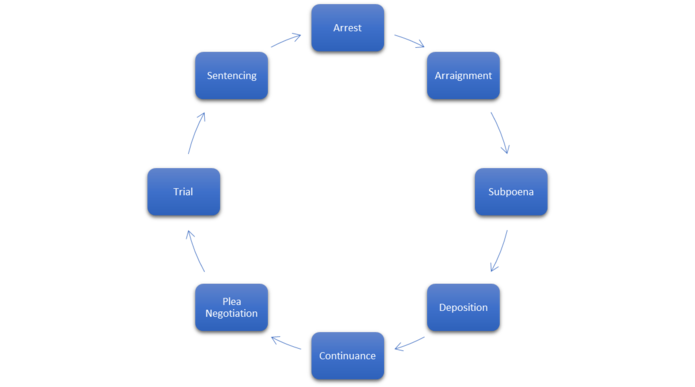
The criminal justice system can be overwhelming for those who are unfamiliar with the process. Here, you will find an overview of the criminal justice system. The Office of the State Attorney does not represent individuals and cannot provide legal advice to them. However, it is charged with the responsibility to see that the rights of victims are protected, and that the judicial system is a fair and judicious place for all members of the communities it serves.
The stages of the criminal justice system are as follows:

After committing a crime:
- An offender may be arrested by a law enforcement officer.
- A court can issue an arrest warrant.
- A State Attorney’s Office may file an Information; or
- A grand jury may recommend charges by returning an Indictment.
FIRST APPEARANCE (Following the Arrest)
If the defendant cannot post bond within hours of the arrest or has been arrested on a no bond offense, or committed a crime which requires a first appearance, the court holds a “first appearance” hearing. The Judge decides whether the defendant can be released and if so, what conditions are necessary to protect you and the witnesses and the public. Victims have the right to be heard at this hearing. A victim can attend the hearing to inform the Judge of their concerns regarding a defendant’s release and conditions upon release or have the State Attorney inform the court of their concerns.
INTAKE
If probable cause is found, the State Attorney’s Office may choose to file charges and summons the suspect into court. Victims may be required to meet with somebody at the State Attorney’s office.
Law enforcement, prosecuting attorneys or any other government official cannot ask or require a victim of a sexual offense to submit to a polygraph examination.
FILING OF FORMAL CHARGES
The State Attorney’s Office may file formal charges after reviewing law enforcement arrest reports, and within 21 days in certain circumstances. The State Attorney’s office has discretion whether to prosecute a person for a crime. The State Attorney’s Office must inform any victims of its decision.
ARRAIGNMENT
The accused is formally charged and enters a plea of guilty, not guilty, or no contest. Victims have the right to be present at the arraignment. In some cases, there will not be a formal arraignment hearing in court.
RELEASE HEARING (SETTING BOND)
If the defendant was unable to post a bond after the initial arrest, or if bond was not set, the defendant is entitled to a bond hearing. The State Attorney’s Office will notify victims of the scheduled hearing and they will have an opportunity to speak regarding the defendant’s release and conditions, or have the State Attorney speak on their behalf.
PRE-TRIAL CONFERENCE
There may be numerous pre-trial conferences (including case status conferences) that allow the court to ensure the case is progressing in a timely manner. Victims will receive notice of the hearing dates. Victims are not required to attend these hearings, unless subpoenaed, but they do have a right to be present. If you are a victim and would like to request a representative from the State Attorney’s Office to attend a hearing with you or on your behalf, please contact the Victim Witness Specialist from your county.
DISCOVERY (PREPARATION FOR TRIAL)
Subpoenas
Victims and witnesses may receive a subpoena for trial, a deposition and/or other hearings. A subpoena summons a person to appear at the time date and location specified.
Depositions
The defendant’s attorney can issue a subpoena for a victim or witness to appear for a deposition. Victims have the right to request a victim witness specialist from the government or non-profit sector to attend the deposition with you. Victims also have the right, as a victim who is not incarcerated, to not be required to attend discovery depositions in any correctional facility.
PLEA NEGOTIATIONS
Many cases are settled through a plea negotiation where the defendant pleads guilty or no contest without a trial. The State Attorney’s Office must consult with the victim before finalizing the plea agreement with the defendant.
PRE-TRIAL INTERVENTION/DIVERSION PROGRAM – According to their discretion and office policy, the State Attorney’s Office may agree to utilize pretrial intervention and diversion programs.
Pre-Trial Intervention Program. A defendant with no more than one nonviolent misdemeanor, who is charged with any misdemeanor or any third degree felony, may be eligible for the pretrial intervention program on approval of the administrator of the program and the consent of the victim, the State Attorney, and the judge. Successful completion of the program results in a dismissal of the charges.
Diversion Program. Diversion is similar to probation where the defendant accepts responsibility for the offense and is released under supervision for six months to a year. During the program, the probation office supervises the defendant. Successful completion of the program results often results in a dismissal of the charges. Victims have a right to provide the State Attorney with their opinion on the defendant’s participation in a diversion program.
TRIAL
Generally, the prosecutor presents evidence to either the judge or a jury about the case. The defendant may be found guilty or not guilty. The process ends if the defendant is found not guilty.
PRESENTENCE INVESTIGATION (PSI) – Victims have the right to provide information regarding the impact of the offender’s conduct to the individual responsible for conducting and/or compiling the presentence investigation. You have a right to review the non-confidential portions of the presentence investigation prior to the sentencing hearing.
SENTENCING HEARING – If the defendant is found or pleads guilty, the judge reviews sentencing guidelines, plea agreements, and other factors and determines what type of sentence the defendant should receive. A sentencing hearing can happen immediately after the plea, after the trial or can be continued to a later date. Victims have a right to provide an oral and/or written victim impact statement (VIS) to the State Attorney’s Office at any time before the court imposes the sentence.
NOTE: If the victim and the offender attend the same school, the victim’s parents have the right to attend the sentencing or disposition of the offender and request that the offender be required to attend a different school. (sec. 960.001(1)(s), Florida Statutes)
RESTITUTION – This involves the court ordering a defendant to compensate victims for losses suffered as a result of a crime as part of the defendant’s sentence. In order to make a claim for restitution, losses must be caused directly or indirectly by the defendant’s crime. If you are seeking restitution, please fill out the victim impact statement and send it to the Assistant State Attorney or Victim Witness Specialist assigned to your case. The Assistant State Attorney can ask the Court to Order the restitution. The defendant cannot be compelled to pay restitution if he is financially unable. However, the Court can ask for a Judgement to be entered.
The information on this page was gathered from the uniform Victim’s Rights Brochure provided by the Office of the Governor. The Victim’s Rights Brochure for the Office of the State Attorney for the Fifth Judicial Circuit can be found here:
